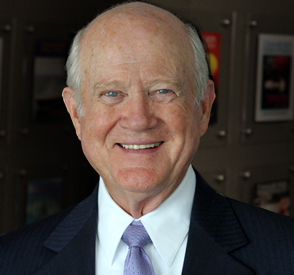What is Performance Management?
The following interview with Dr. Aubrey C. Daniels, founder of Aubrey Daniels International (ADI) and the behavior-based management process Performance Management (PM), is reprinted from the archives of Performance Management Magazine.
 Dr. Daniels, just what is Performance Management? "In simplest terms, it's a way of getting people to do what you want them to do and to like doing it."
Dr. Daniels, just what is Performance Management? "In simplest terms, it's a way of getting people to do what you want them to do and to like doing it."
You mean in the workplace? "Everywhere. At home, in schools, wherever you depend on the performance of another person. Of course, the applications we're most concerned with are in the workplace. That's our business - helping managers get employees to perform to their potential through positive means."
You mention people liking doing what you want them to do. Why is it necessary for employees to like doing what they're paid to do already? "There are a number of ways to get people to do what you want, but unless they like doing it, the company has lost something, because no one works up to his/her potential unless he or she is positively motivated. For example, if you threaten an employee with being fired, chances are he'll do just enough to keep his job, but no more. And, if jobs are plentiful, he might pull a Johnny Paycheck and tell you to "take this job and shove it." Another problem with negative motivation is that one way or another an employee who's been coerced into something will get even. That explains a lot of sloppy work and even the deliberate sabotage we hear about today."
 Okay. It's important for people to like doing what you want them to do. But how do you get people to do better work? With better pay? Benefits? Better working conditions? Is it all or none of the above? "None of the above. Let's suppose you went into a plant and announced that everyone with five year's service would get an extra week's vacation. What have you done? You've rewarded the good performers and the poor performers equally. No one has done anything to earn the extra week except for being there. The good ones will conclude that it doesn't pay to perform well, and the poor ones will conclude that it does pay to perform poorly. After a while, the extra week will just be taken for granted anyway. Ever since WWII, when jobs became plentiful, American companies have been adding benefits and wages. What do we have? Declining productivity and quality."
Okay. It's important for people to like doing what you want them to do. But how do you get people to do better work? With better pay? Benefits? Better working conditions? Is it all or none of the above? "None of the above. Let's suppose you went into a plant and announced that everyone with five year's service would get an extra week's vacation. What have you done? You've rewarded the good performers and the poor performers equally. No one has done anything to earn the extra week except for being there. The good ones will conclude that it doesn't pay to perform well, and the poor ones will conclude that it does pay to perform poorly. After a while, the extra week will just be taken for granted anyway. Ever since WWII, when jobs became plentiful, American companies have been adding benefits and wages. What do we have? Declining productivity and quality."
The definition of Performance Management you gave in answer to my first question was clear, but it didn't tell me enough. Can you elaborate? "Of course. Let me give you a formal definition. Performance Management is a scientifically based, data-oriented management system. It consists of three primary elements-measurement, feedback and positive reinforcement. Although each of these three elements can exist alone, all three must be present before you have true Performance Management. And they must be implemented systematically and in sequence."
 What do these elements mean and how do they improve performance? "Measurement means that data is collected on employee performance to establish a starting point, or baseline. To improve performance, you have to know what current performance is. By the way, the ultimate reason for measurement is to know whom and when to positively reinforce. The sharing with employees of this ongoing data collection is feedback, and its purpose is to permit them to monitor their performance. Positive reinforcement is appropriate recognition of improved performance or of behavior that leads to improvement. It doesn't really matter if this reinforcement is tangible or social, scheduled or unscheduled, but it must be frequent and must be meaningful to the employee. What matters most is that reinforcement is contingent upon performance improvement."
What do these elements mean and how do they improve performance? "Measurement means that data is collected on employee performance to establish a starting point, or baseline. To improve performance, you have to know what current performance is. By the way, the ultimate reason for measurement is to know whom and when to positively reinforce. The sharing with employees of this ongoing data collection is feedback, and its purpose is to permit them to monitor their performance. Positive reinforcement is appropriate recognition of improved performance or of behavior that leads to improvement. It doesn't really matter if this reinforcement is tangible or social, scheduled or unscheduled, but it must be frequent and must be meaningful to the employee. What matters most is that reinforcement is contingent upon performance improvement."
You mean that a manager should not just pass out compliments for the sake of being a nice guy? "That's right. Managers who practice Performance Management are usually popular with their employees, but being popular is not the object of positive reinforcement. The object is to recognize specific performance improvements—and as soon as possible after the improvement occurs. Performance Management has also been described as "contingency management." I don't use that term because it has a different meaning in business, but the idea is that every behavior has some consequence. When employees know that desirable consequences—bonuses, time off, or just a pat on the back—are contingent upon good performance, they perform better. It's that simple."
And what about the consequences for not doing good work? "That goes back to a point made earlier about threats. If a company provides undesirable consequences for not performing well, performance will improve, but only as long as the threat is maintained. We call that negative reinforcement. It's more likely to work in bad economic times than in good, but in either case it creates a reservoir of hostility that no sensible manager wants. There are times when you must use negative consequences, but in the most effective organizations that is only a fraction of the time."
In the definition you gave,you said that Performance Management is scientifically based. Can you explain? "It is based on laws of human behavior that have been tested time and again in experimental and applied research in laboratories, universities, hospitals, schools, clinics and businesses. Times change. People change, but the laws that govern behavior don't."
Dr. Daniels, you are a psychologist. Is Performance Management something you devised, or do others practice it? "First, let me clarify a point. I'm trained as a psychologist, and I've had experience in clinical psychology. But I don't consider Performance Management a branch of psychology. We don't analyze anyone or treat anyone for mental disorders. What we do is show managers how to apply the laws of behavior to the work setting. "Now, to answer your questions, Performance Management is a term that we adopted because it is very descriptive of the work we do. The term favored by most psychologists is 'behavior modification.' I didn't invent that. The pioneer in behavior modification was the American psychologist, Dr. B. F. Skinner. Essentially, Dr. Skinner's work demonstrated that behavior could be changed without resorting to psychoanalytic type explanations `a la Sigmund Freud, which we have become so accustomed to hearing."
 Are you saying that Freud was off the mark? "In many ways, yes he was. Freud made a contribution to the advancement of our understanding of behavior, but his contribution was not his theory. Joseph Wolpe, in an article published in The American Psychologist, said that not one of Freud's major theoretical concepts has ever been supported by scientifically acceptable data. However, Freudian notions have become so ingrained in our society over the last 80 years or so that they are accepted as fact. Besides, a manager has neither the time nor the training to play "shrink" with his/her employees, even if it did work. "To get back to your question of whether anyone else is practicing Performance Management: the answer is yes and no. I don't know of any other consulting firm who is applying PM in exactly the same way as we are at Aubrey Daniels & Associates [now Aubrey Daniels International]. But the fundamentals of behavior modification are being used in many organizations to greater or lesser degrees."
Are you saying that Freud was off the mark? "In many ways, yes he was. Freud made a contribution to the advancement of our understanding of behavior, but his contribution was not his theory. Joseph Wolpe, in an article published in The American Psychologist, said that not one of Freud's major theoretical concepts has ever been supported by scientifically acceptable data. However, Freudian notions have become so ingrained in our society over the last 80 years or so that they are accepted as fact. Besides, a manager has neither the time nor the training to play "shrink" with his/her employees, even if it did work. "To get back to your question of whether anyone else is practicing Performance Management: the answer is yes and no. I don't know of any other consulting firm who is applying PM in exactly the same way as we are at Aubrey Daniels & Associates [now Aubrey Daniels International]. But the fundamentals of behavior modification are being used in many organizations to greater or lesser degrees."
There are a lot of approaches, management theories, et cetera, being used to improve quality and productivity today. How does Performance Management fit in? "I think many of them would benefit from the addition of Performance Management. Most of the techniques I've examined have merit-some more than others, of course-but they lack technology: that is, they tell you what needs to be done, but they don't tell you how to do it. Performance Management provides the technology that other approaches lack."
Frankly, it all sounds rather simple. If it-s as effective as you say, why isn-t every company using it? "You're right. It does sound simple, and that may account for the fact that it isn't used more widely. In fact, some managers who hear it described dismiss it as too simple to really work. But it does work. The most frequent comment I hear from managers is that they've been doing it for years. Well, they might have been doing bits of it, say giving feedback, or they might be considerate enough to occasionally tell employees they're doing a good job. But unless all of the elements are present and applied systematically, you're not practicing Performance Management, and if you're not applying it systematically you're not getting maximum performance. It's true that the concepts are simple to understand, but there is a lot more to PM than appears at first glance. Neither common sense nor mere experience may ever tell you what you need to know about the laws of behavior to get the most out of your relationships at home, work or play."
 If Performance Management relies heavily on measurement, aren't there a lot of service-industry and white-collar workplaces where it can't be used? "Not really. Our philosophy is that anything can be measured; and if it can be measured, it can be improved. Of course, in some types of work, quality is subjective-artwork, for example. But even subjective criteria are useful, as long as both the person doing the work and the person evaluating it are in general agreement as to what constitutes quality. In addition, there are such things as turnaround time, errors and rejections that can be measured in more concrete terms. I've seen great improvements in both quality and productivity occur when Performance Management principles are applied to hard-to-measure activities."
If Performance Management relies heavily on measurement, aren't there a lot of service-industry and white-collar workplaces where it can't be used? "Not really. Our philosophy is that anything can be measured; and if it can be measured, it can be improved. Of course, in some types of work, quality is subjective-artwork, for example. But even subjective criteria are useful, as long as both the person doing the work and the person evaluating it are in general agreement as to what constitutes quality. In addition, there are such things as turnaround time, errors and rejections that can be measured in more concrete terms. I've seen great improvements in both quality and productivity occur when Performance Management principles are applied to hard-to-measure activities."
You've said nothing to indicate that firms keep it a secret when they implement Performance Management. Don't employees see positive reinforcement as an attempt by management to manipulate them? "No they don't. There is nothing we teach a manager that we would not want everybody in the organization to know. It is just as important for employees to positively reinforce managers as it is for managers to reinforce them. Whenever people don't know what management is up to, we get into game playing with everybody trying to figure out "real motives," strategies, and so on. This is always counterproductive. If people ask you why you are giving them positive reinforcement-tell them. If you don't know why, then you're doing it wrong. If you don't want to tell why, then I would question your motives myself. "Manipulation is when you promise a positive consequence that you have no intention of delivering or cannot deliver. When people know what they have to do to get positive reinforcement and get it on that basis, they never feel like they are being taken advantage of. It is the responsibility of a manager to commit only to those things that he or she has control of. "The other part of a PM program that is very reassuring to most employees is that management is actively involved in the process. Managers all the way to the top are using the same approach with the people that report to them that front-line supervisors are using with the front-line employees."
 One final question. Does Performance Management work miracles? "A lot of people say it does, but we've never claimed that. We've seen changes that people say they never would have believed possible prior to PM. We've seen problems solved quickly that people had previously been trying to solve for years without success. There certainly are enough success stories around to demonstrate that PM has the potential to greatly increase employee productivity and do it in a way that people like. To many people, that's a miracle." "Manipulation is when you promise a positive consequence that you have no intention of delivering or cannot deliver."
One final question. Does Performance Management work miracles? "A lot of people say it does, but we've never claimed that. We've seen changes that people say they never would have believed possible prior to PM. We've seen problems solved quickly that people had previously been trying to solve for years without success. There certainly are enough success stories around to demonstrate that PM has the potential to greatly increase employee productivity and do it in a way that people like. To many people, that's a miracle." "Manipulation is when you promise a positive consequence that you have no intention of delivering or cannot deliver."
Published November 13, 2000
Client Perspective: Rich Gold, M&T Bank


